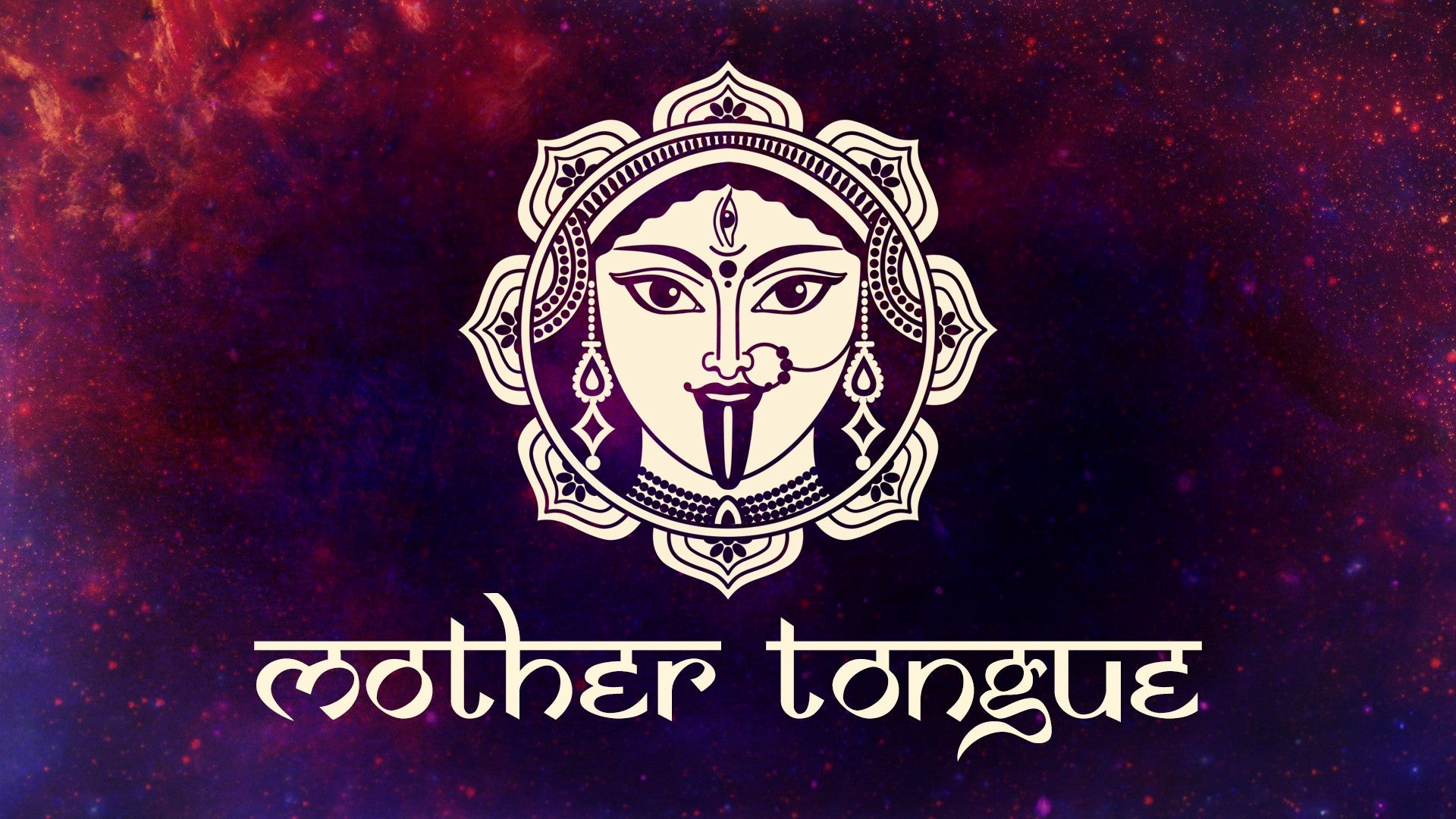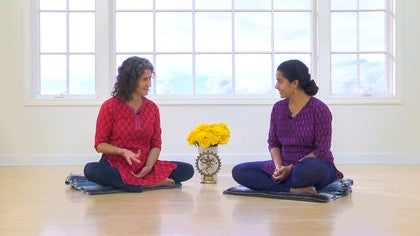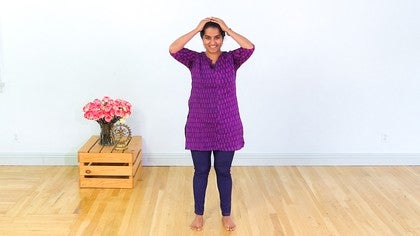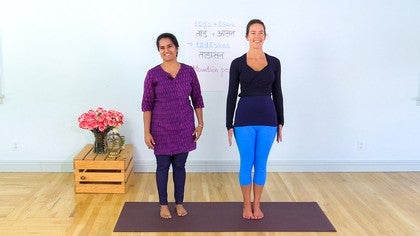Description
About This Video
Transcript
Read Full Transcript
Welcome back to another season of Mother Tongue, and thank you, Anurada. Thank you. Just such a joy to be together. And in this season, we explore the proper pronunciation of the posture names in Sanskrit. And this, of course, begs the question of why it might be important to begin to practice and play with pronouncing these postures correctly.
That is, it is important to start recognizing the importance of correct sound and how correct sound can help in channelizing or rather aligning energies in specific manners within us. So when one takes on a certain posture in an asana, it is a kind of a body engineering where one is aware of the fact that the body moved in that position will allow the energies within to circulate in a particular manner, will allow the breath to move in a particular manner. Similarly, when one does pranayama, which is the practice of the breath, it is a very conscious way of moving the breath to align oneself with something deeper within us. And so pranayama can be considered something like breath engineering. In that same context, sounds play a very important role in restructuring our vibratory pattern.
So when one pronounces a word correctly, then one is engaging in a conscious sound engineering process. So when one takes a particular posture, which is described by the Sanskrit words, it's not just a descriptive term to describe that posture very often. There is a truth of the vibratory effect of individual sounds within that word that serve to stimulate different chakras within the body. Because the Sanskrit words come from the Sanskrit alphabet where sound is a very self-conscious tool of transformation in itself. So when one starts pronouncing a word correctly in Sanskrit, it can have a huge difference or it can have a huge impact on the physiological experience of the sound.
In itself. So like I heard the term pavrittatrikonasana, chikonasana. But the original sound of that particular asana is parivrittatrikonasana. Now you've mentioned the chakras several times and I've heard that each petal of the chakras represents one of the letters of the Sanskrit alphabet. Is this true?
Yes. So in the science of understanding the impact of sound on our bodies and the impact of sound in the universe in general, which has been studied deeply in the tantra shastra or in the tantra, yoga, they have identified the correspondence of different letters of the Sanskrit alphabet, the 50 letters of the Sanskrit alphabet and seen their corresponding association with the different chakras. So like you have all the vowels in your throat, then you have the first few sets of the consonants, it goes down. And what is fascinating is that it sort of spirals its way down into your body, into the last chakra. So just when you are reciting the Sanskrit alphabet, which is a practice in India and I believe also for the Buddhist tradition, where they just recite the Sanskrit alphabet and they say it's a way of keeping good health.
Because if your chakras are well stimulated, if the energy is well balanced in the center, then it's an automatic way of ensuring that you feel, you feel more harmonious, more complete. So that's the correspondence with the different chakras plus these sounds correspond to the different organs and the different limbs, the different joints of the body. So I think it's quite fantastic, the fact that just by a sound you can at the subtle level generate a harmony within the being. What seems to happen for some teachers of yoga, particularly in this country, in America, is there's such a deep desire to allow these teachings to be accessible, to be non-intimidating, to feel safe, to feel welcoming no matter where somebody might feel they are. And something I've heard and encountered is a nervousness or a fear on the part of some yoga teachers to step forth into these sounds and even attempt to start to pronounce them, we'll use the word correctly for now, for fear of intimidation.
And so what we can consider incorrect is maybe also a translation of the sound so that it doesn't feel so intimidating. Can you help inspire maybe some of the yoga teachers out there that might be feeling this way, uncertain, afraid of feeling of appearing hoity-toity or lofty or more in the know than another? Can you help inspire and soften some of these fears? It's a very legitimate concern, I would say, for yoga teachers to feel that way because of the unfamiliarity with the sounds of the Sanskrit language, which is the basis of the names of the postures. But I would love to invite all the yoga teachers to experience the power of these sounds for themselves first.
I think it has to do with the conviction of the universality of the name, our normal tendency with language is to associate language only as a means of communication. And therefore what seems to become important is to communicate the idea rather than go a step beyond and experience the power of the idea. So I would invite yoga teachers to try and see for themselves whether it makes a difference or not because at the end I think all these things have to correspond to your own experience. That is one of the most valuable lessons we learn from the Indian tradition that no matter how lofty the philosophy and everything, if it does not correspond to your deeper experience, you can safely keep it aside. So in that context I would tell the yoga teachers, I would tell them that it's not only about the communication of the posture, sure that is important, and if it helps the student to understand how to position their body, so if you say a mountain pose or a downward facing dog pose, then that is fine.
But then if one goes into the experiential value of the sound that corresponds to the name of that asana, adho mukha swana asana. So I would invite the yoga teachers to try and understand the universality of these words, to try and release them from their conditioning that this belongs only to the Indian tradition. Because I think if the loyalty is towards the communication of yoga, which is again not a monopoly of the Indian tradition alone, since it has to do about trying to help an individual reconnect to a deeper truth within themselves, which is of a universal nature, I think if that is the deeper intention of a yoga teacher, then first and foremost they would like to experiment or they might consider experimenting with feeling comfortable with these words in themselves, in their universal nature, and then secondly seeing the context and gradually introducing the students also to this the nature of the power of true sound, and therefore say it, and there's always scope for improvement, no one is perfect, no one gets it right the first time. But if there is the true spirit of yoga, which is really a spirit of seeking of truth, of letting go of one's conditionings, of letting go of one's masks that we hamper our being with, then I think it would allow an individual to become more simple and to say that, okay this is what it is and this is what it is. And yeah, I think the fear often comes with this, because fear itself, if you hear the sound of the word, fear is in contrast to the very nature of yoga.
Fear is like, and fear is, so where is one coming from? I think it becomes important to recognize the point of departure for the teacher. If you're starting from a position of fear, then I think there is some work to be done. So there is a difference of staying away or hesitating with Sanskrit pronunciations out of fear, and there is a difference with hesitating to pronounce Sanskrit words because it's not the right time. They look the same, but they're not the same, because the teacher is at a different starting point.
And therefore, yeah, in the true spirit of yoga, see what helps you become more simple and more happy and play, become a child who is ready to play and share that play with co-travelers is what I would say. And also maybe as you do the asanas, you do the asanas and become conscious of the energy and then try to pronounce it correctly. Embrace the energy and see if it works for you. So this is how we invite you. Let this series of how to play and practice with these pronunciations be an experimental internal opportunity to more deeply know yourself, not in the interest of getting one more thing right, or establishing authority over another, but as an opportunity to find out if you can find deeper alignment, and if these help you experience the postures more fully, the practice more fully, yourself more fully, and then it will be very natural to share with others to communicate in this way.
So yes, it seemed good, very good. Something true. So thank you again for being with us. Thank you, Annareta. Thank you, Kira.
Let us know how these work. Thank you.
Mother Tongue: Pronouncing the Postures
Comments
You need to be a subscriber to post a comment.
Please Log In or Create an Account to start your free trial.

















